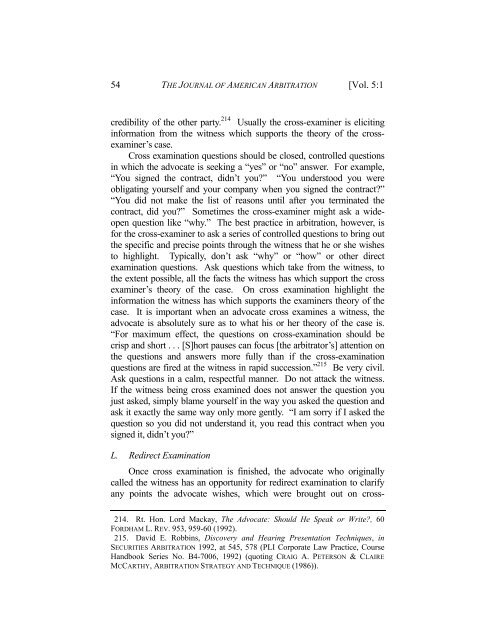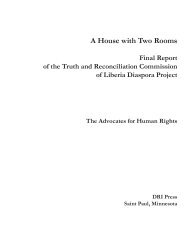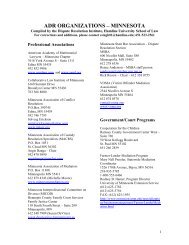2006/Vol. 5 No.1 - Hamline Law - Hamline University
2006/Vol. 5 No.1 - Hamline Law - Hamline University
2006/Vol. 5 No.1 - Hamline Law - Hamline University
Create successful ePaper yourself
Turn your PDF publications into a flip-book with our unique Google optimized e-Paper software.
54 THE JOURNAL OF AMERICAN ARBITRATION [<strong>Vol</strong>. 5:1<br />
credibility of the other party. 214 Usually the cross-examiner is eliciting<br />
information from the witness which supports the theory of the crossexaminer’s<br />
case.<br />
Cross examination questions should be closed, controlled questions<br />
in which the advocate is seeking a “yes” or “no” answer. For example,<br />
“You signed the contract, didn’t you?” “You understood you were<br />
obligating yourself and your company when you signed the contract?”<br />
“You did not make the list of reasons until after you terminated the<br />
contract, did you?” Sometimes the cross-examiner might ask a wideopen<br />
question like “why.” The best practice in arbitration, however, is<br />
for the cross-examiner to ask a series of controlled questions to bring out<br />
the specific and precise points through the witness that he or she wishes<br />
to highlight. Typically, don’t ask “why” or “how” or other direct<br />
examination questions. Ask questions which take from the witness, to<br />
the extent possible, all the facts the witness has which support the cross<br />
examiner’s theory of the case. On cross examination highlight the<br />
information the witness has which supports the examiners theory of the<br />
case. It is important when an advocate cross examines a witness, the<br />
advocate is absolutely sure as to what his or her theory of the case is.<br />
“For maximum effect, the questions on cross-examination should be<br />
crisp and short . . . [S]hort pauses can focus [the arbitrator’s] attention on<br />
the questions and answers more fully than if the cross-examination<br />
questions are fired at the witness in rapid succession.” 215 Be very civil.<br />
Ask questions in a calm, respectful manner. Do not attack the witness.<br />
If the witness being cross examined does not answer the question you<br />
just asked, simply blame yourself in the way you asked the question and<br />
ask it exactly the same way only more gently. “I am sorry if I asked the<br />
question so you did not understand it, you read this contract when you<br />
signed it, didn’t you?”<br />
L. Redirect Examination<br />
Once cross examination is finished, the advocate who originally<br />
called the witness has an opportunity for redirect examination to clarify<br />
any points the advocate wishes, which were brought out on cross-<br />
214. Rt. Hon. Lord Mackay, The Advocate: Should He Speak or Write?, 60<br />
FORDHAM L. REV. 953, 959-60 (1992).<br />
215. David E. Robbins, Discovery and Hearing Presentation Techniques, in<br />
SECURITIES ARBITRATION 1992, at 545, 578 (PLI Corporate <strong>Law</strong> Practice, Course<br />
Handbook Series No. B4-7006, 1992) (quoting CRAIG A. PETERSON & CLAIRE<br />
MCCARTHY, ARBITRATION STRATEGY AND TECHNIQUE (1986)).
















